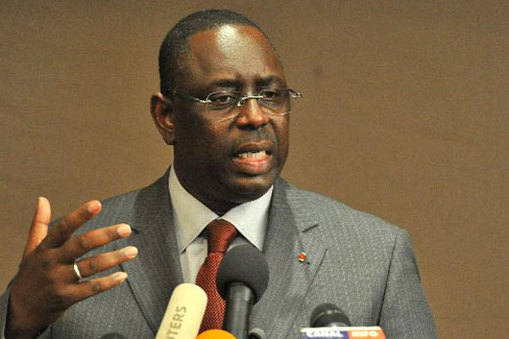President Macky Sall of Senegal has thrown his weight behind the adoption of agricultural biotechnology in the country.

He made the declaration during the 2017 Annual Session of the Senegal National Scientific and Technical Academy (ANSTS) on the situation, implications and perspectives of genetically-modified organisms (GMOs) in the country.
At a session chaired by him, President Sall made it clear that he supported the implementation of biotechnology in Senegal provided necessary measures to minimise risks were taken.
“I must say very clearly that I am for the use of GMOs based on the precautions taken and based on a dynamic regulation, otherwise we would be against progress. We must decide and step forward. We need to move forward because we have food security imperatives.
“This is a society choice that engages the future of our nation. It must be taken with full knowledge of the facts, while respecting the interests of present and future generations. Our new strategy for economic and social development is based on the science and technology sector, which is essential for the progress and well-being of the people. That is why I want to seek the ‘informed opinion of the Academy’ on the issue of GMOs which remains an important development issue.
“It is undeniable that GMOs can help meet current challenges, such as food insecurity, public health issues, natural resource conservation and climate change,” he stressed.
The President agreed that it was because biotechnology was an opportunity to effectively respond to these challenges that he agreed with ANSTS that “the precautionary principle must not lead to inertia. There is also a need to amend the 2011 law regulating biosafety.”
Sall instructed the Minister of Environment and other stakeholding government institutions to help speed the process of revising the biosafety law, which was currently unworkable.
“We need serious thought to develop a strategy to maximise the use of GMOs, while mitigating the risks associated with them. That is why it is necessary to strengthen the National Biosafety Authority and to have an appropriate legal system combined with an efficient information system based on objective scientific values to assess the cost/benefit/risks ratio,” he further stressed.
Vice-Chair of the Academy, Ms. Yaye Kene Gassama, presented the findings of a study carried out by the institution on the opportunities and risks for adopting biotechnology in Senegal.
According to her, “It is scientifically proven by notable international institutions that GMOs are safe food and feed,” adding however that precautious measures needed to be taken to minimise potential environmental risks.
On socio-economic concerns, Gassama said that “based on the study, 68% of the population in the country support the adoption of GMOs, 21% are against and 11% had no expressed opinion.”
The Session was an opportunity for the Regional Office of the New Partnership for Africa’s Development (NEPAD) in Dakar to access up-to-date information on the status of biotechnology and scientific research in the country as well as meet members of the scientific community and decision makers of the country.
For the African Biosafety Network of Expertise (ABNE), which has been supporting Senegal, it was an achievement.
“The academic session has paved the way for a quick revision of the restrictive biosafety law in the country and for a smooth adoption of biotechnology in the country for several years. The necessary resources should be allocated to facilitate the process and especially to support ANB with adequate equipment and capacity building.
By Abdallah el-Kurebe

A great review of the science of GE crops can be read on-line. “Planting the Future” by the European Academies Science Advisory Council 2013
Wager is a Monsanto $hill. Best blocked and ignored.
And once again, you forgot to point out that the European Academies Science Advisory Council authors have conflicts of interests and or financial ties. NOT to be trusted!
Reidunn Aalen – has a patent on plant gene for use in genetic engineering. http,COLON>//wwwfreshpatents.com/Reidunn-Aalen-Oslo-invdiraphp
Ervin Balazs – “former founding general director of the Agricultural Biotechnology Center Gödöll,, lead a unit on molecular virology and genetic engineering of crops”
Ralph Bock – “Director of the Institute of Biochemistry and Biotechnology of Plants”,
Ian Crute : “has had a 40 year career in crop research”
Michel Delseny : Laboratoire Génome et Développement des Plantes
Torbjörn Fagerström : President of the Swedish University of Agricultural Sciences
Evert Jacobsen : “WU Plant Sciences. Subdivision, Laboratory of Plant Breeding.”
Ivan Kreft : “agronomskih znanosti, redni profesor genetike na Biotehniški fakulteti”
Birger Moller : “Center for Synthetic Biology”
Ewen Mullins : “15 years experience in US & Ireland in Plant Biotechnology.”
Enrico Porceddu “docente presso la facolta’ di Agraria dell’Universita’ di Viterbo.”